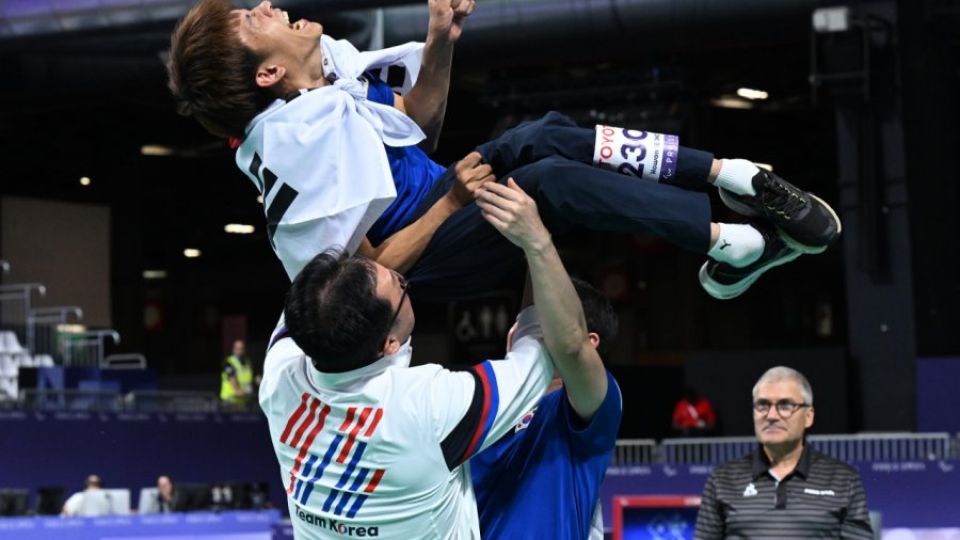September 4, 2024
SEOUL – At South Paris Arena 1, in Paris, Monday, South Korean boccia athlete Jeong Ho-won carefully surveyed the playing field from his wheelchair, as the referee, ruler in hand, measured the distances between the lined-up balls.
In boccia, where winners are determined by how close their balls land to a target ball, called the jack, every fraction of an inch matters.
As the referee’s call all but guaranteed his win, Jeong cast aside his eye blinder and rushed to embrace his visibly emotional coach and assistant, Kim Seung-kyum. The stadium erupted in applause, celebrating Jeong’s triumph over Australia’s Daniel Michel by a final score of 5-2.
This victory marked Jeong’s fourth Paralympics gold in boccia, crowning his remarkable 26-year career in the sport.
As captain of the national team, he has contributed to South Korea’s impressive showing at this year’s Games. The country’s boccia medals now include Jung Sung-joon’s silver in the men’s BC1 class, Jeong So-yeong’s silver in the women’s BC2 category, and Kang Sun-hee’s bronze in the women’s BC3 division.
Boccia, a precision game similar to bowls or boccie, stands out as one of only two Paralympic sports without an Olympic equivalent. With a growing fan base globally, it has been described by the International Paralympic Committee as the “fastest-growing sport” within the Paralympics movement.
Originally created for athletes with cerebral palsy, players roll six balls each per end, with the game consisting of six ends. Players are categorized into four classifications – BC1, BC2, BC3 and BC4 – based on their impairment and functional ability.
Jeong, who has cerebral palsy as a result of a fall at just 1 year old, competes in the BC3 class intended for athletes with severe locomotor impairments. To play, he uses a specialized mouth-held pointer to guide the ball down a ramp positioned before his wheelchair. His assistant, the aforementioned coach Kim, arranges the equipment based on Jeong’s directions.
Jeong’s latest achievement is a milestone for both the athlete and his nation. With seven Paralympic medals and numerous titles in global competitions, Jeong has cemented his status as the sport’s most decorated player. South Korea has now secured at least one boccia gold in ten consecutive Paralympics since the 1988 Seoul Games, continuing its global dominance in the sport.
For Jeong and the Korean team, the pursuit of medals is far from over. Tuesday was to see Jeong compete alongside Kang Sun-hee in the pairs event, keen to add to their already impressive medal tally.
As of Monday, bolstered by Jeong’s recent gold, South Korea had amassed three gold, seven silver and eight bronze medals, sitting 14th in the overall standings. The country is fielding 83 athletes across 17 sports at this year’s Games, which are set to conclude Sunday.


